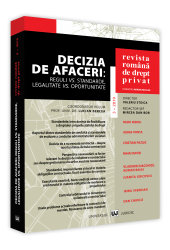Decizia de a nu executa contractul – despre oportunitatea ilicitului contractual
The decision not to perform the contract – on the desirability of breach of contract
Author(s): Cristian PaziucSubject(s): Law, Constitution, Jurisprudence, Civil Law
Published by: Universul Juridic
Keywords: contract; efficient breach; morality of breach; the principle of specific performance;
Summary/Abstract: If, as generally considered, the moral duty generated by a contractual promise flows from the voluntary nature of such promise, the automatic moral condemnation of the nonfulfillment of the obligation in its specific nature, even if voluntary and without legal justification, sits on weak rational grounds. Because practical constraints such as information and negotiation costs cause all contracts concluded in practice to have an incomplete nature in the sense that there is no real, subjective agreement on all circumstances which could interfere with the performance of the contract, the scope of the moral duty is narrower than that of the legal duty flowing from the contract. Morally, the promisor may be considered as bound to perform specifically in circumstances for which he explicitly undertook such duty and in those in which he would have undertaken to perform had the contract been a complete one. In circumstances where the cost of performance is higher that the benefit conferred to the promisee, there is no price for which the parties would have agreed on specific performance if they had anticipated such circumstances and bargained over them. Against this background, all that can be stated with certainty with respect to the failure to perform contractual obligations generally – even if voluntary – is that it has an ambiguous moral status, depending on the specific circumstances. There are, as a consequence, no good reasons for the system of remedies for unjustified non-performance of contractual obligations to be based on a preconception that the non-fulfilment of the contract specifically is immoral. Eliminating such preconception from the equation brings to light the technical arguments for which it is possible to limit the scope of specific performance, in cases of manifest inefficiency, by using the prohibition of abuse of rights, as well as the arguments for which specific performance is not a preeminent remedy and is not mandatory for the promisee for the simple fact that it is still possible and of interest. Further, in line with trends visible in comparative law, such solutions reflect the reality that specific performance can sometimes be inefficient, such that discouraging, in all cases, the nonfulfillment of contractual obligations in their specific nature can prove to be, in turn, socially undesirable.
Journal: Revista Română de Drept Privat
- Issue Year: 2019/2019
- Issue No: 03
- Page Range: 82-109
- Page Count: 28
- Language: Romanian
- Content File-PDF

